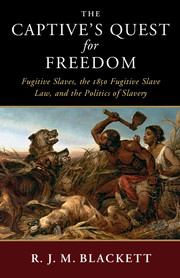 The Captive's Quest for Freedom
The Captive's Quest for Freedom Conclusion
Published online by Cambridge University Press: 19 January 2018
Summary
If there was a place in the Free States where fugitive slaves could feel secure, it was the area along the shores of Lake Erie known as the Western Reserve. Elisha Whittlesey, a longtime resident of Cleveland, and a Treasury Department official in the Fillmore administration, recalled that the area's residents not only openly violated the law, they also employed agents to go south to aid and encourage slaves to run away. He knew it as the “most rabid antislavery district” in the North. In early 1861, one local editor looked back with some pride at the fact that no escapee had been returned from Cleveland in almost nineteen years. But the editor had gotten ahead of himself. If, in the past, the city had remained steadfastly committed to the protection of fugitive slaves, times had now changed. The victory of the Republican Party in the presidential and congressional elections of 1860, on a platform to limit slavery to its existing territory, had altered the national political landscape. These results were met by a chorus of counterclaims from Southern states demanding guaranteed constitutional protection for slavery and slave property. There were also voices calling on Southern states to withdraw from the Union. South Carolina took the first step on December 20, 1860. Within a month, three other states would join the movement to leave the Union.
In the midst of this crisis, John Goshorn and his son William, two slaveholders from western Virginia, arrived in Cleveland in search of Sarah Lucy Bagby, a twenty-eight-year-old slave who had escaped in October 1860. In Cleveland, Bagby was taken under the care of William E. Ambush, president of the Fugitive Aid Society, a black organization. Ambush found her a job, first, at the home of A. G. Riddle, the Republican congressman-elect, and, later, at L. A. Benton's, where she was captured in mid-January by the Goshorns, assisted by two deputy US marshals, who took her to the city jail to await a hearing. Word of her capture spread quickly. The authorities were taken by surprise at the speed with which a large crowd of African Americans gathered in the courtyard between the jail and the courthouse where the hearing was to be held.
- Type
- Chapter
- Information
- The Captive's Quest for FreedomFugitive Slaves, the 1850 Fugitive Slave Law, and the Politics of Slavery, pp. 441 - 460Publisher: Cambridge University PressPrint publication year: 2018


